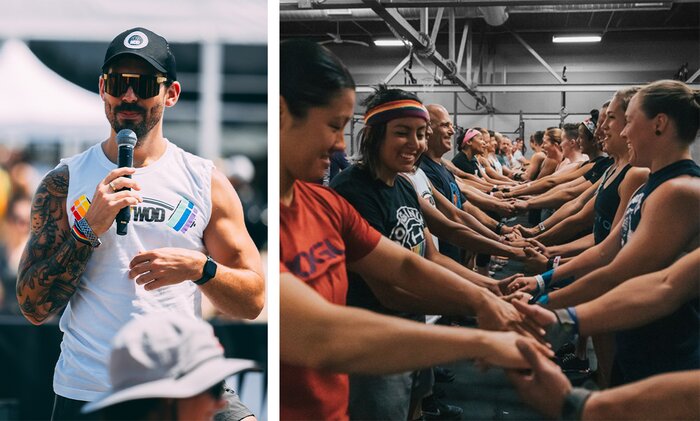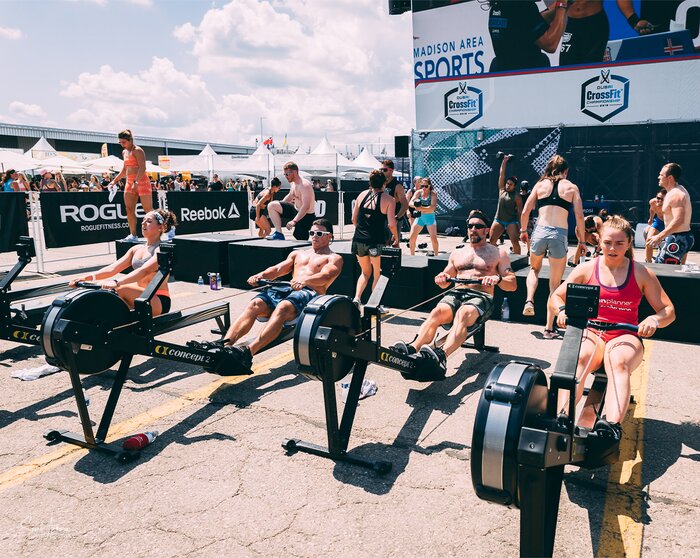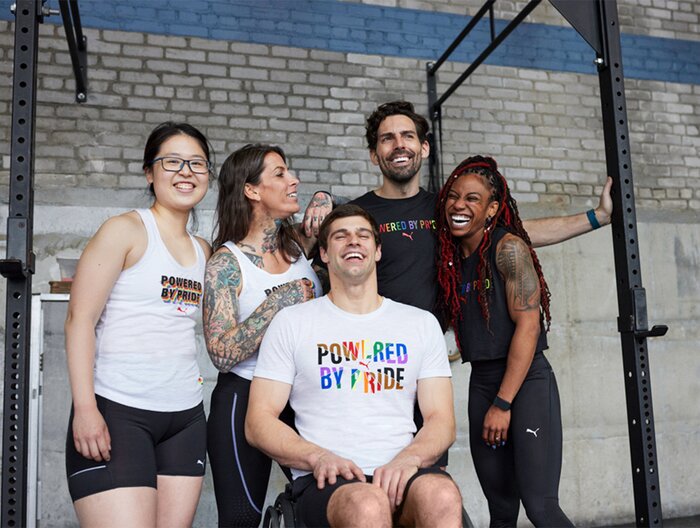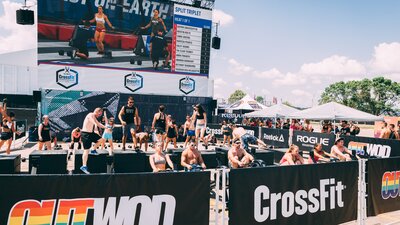Will Lanier was an experienced CrossFit coach and athlete dismayed by the lack of gay and queer lifters in the gyms where he worked. So, he did something small about it, scheduling monthly inclusive workouts. And then that small thing grew into something far larger.
Over the course of a decade, Lanier's efforts have blossomed into Out Athletics, a nonprofit organization working to share the transformative power of strength training with LGBTQ populations nationwide. On any particular weekend, you can find a dozen or more workouts at gyms spanning major metropolitan areas, but also in far smaller towns in Utah or Mississippi.
Here's how Lanier describes the journey that resulted in these "hourlong CrossFit workout-slash-dance-parties" and the impact he's seen them make.
I'm Actually Stronger Than I Thought
When someone who has perhaps never worked out starts strength training, it's very empowering. Many people in the queer community have never felt strong. They've never felt powerful. They've never felt confident. They've never felt like they were capable of stuff like that. They feel like they're considered weak.
But when they get into strength training, they're like, "Wow, I'm actually stronger than I thought." So it's physical, but also mental. It helps them build confidence into their lives. We've had kids get kicked out of the house for being gay, and they're like, "My life is nothing." Then they get into training, and it increases their confidence to apply themselves and to do something.
Another great thing is that lot of people don't have structure in their lives. Training provides structure. Basically, all the great life-changing things that we know training does are even more impactful in the queer community.

A Different Kind of WOD
Back in 2010, I was coaching CrossFit in New York and noticed that there just weren't a lot of gay people there—which was surprising to me. I had just moved to town and I had a bit of a selfish desire to make friends and bring them into what I like to do. But I also wanted to see more people be a part of CrossFit because it had provided such great community for me, and I knew it could do the same for other people.
So, I started a little social group called GayWOD, to kind of "take the slur back." But what we're doing now wasn't the initial goal. It was more like, "Let's make a fun event and bring gays together."
I arranged a monthly workout event in New York, and like six people showed up to the first one. But then we had 10 or 12, then 15-20, then 50, then 100. Then people and gyms from Miami, Chicago, and Los Angeles started reaching out, saying, "We want to do a workout here."
And I found myself thinking, "Holy shit. People actually like this. So can we do more for the LGBTQ community?"
Building Strength, Building Community
We want to be able to allow gay and queer people to participate in their own health and wellness in a meaningful way. Otherwise, a lot of the way that the LGBTQ community get together tends to be centered around drugs and alcohol. A typical event is kind of an hourlong dance-party-slash-CrossFit-workout.
Pre-Covid, what we usually did was a team-style workout, which lends itself to community building. There would be a warm-up, then a few different "stations." That also allows us to make these events scalable for everyone, which is essential. Someone who has been training all their life can come and still get a great workout, but so can the person who's never worked out before.
But we also cater workouts to what a gym offers. We've done strongman events where they learn to lift stones. We've done rock climbing, and spin, and yoga. It really opens up opportunities for people to do different things.
Educating Gyms to Break Down Barriers
Another big part of what we do is educating people about the barriers between people and health. One is socioeconomic: Gyms are expensive. Healthy food is expensive. Workout clothes are expensive. So, there's a socioeconomic barrier. But another barrier is acceptance: People don't feel comfortable, because a gym hasn't made efforts to promote inclusion.
Sure, homophobia or transphobia can be one reason. But in many cases, I began to discover, it wasn't a phobia. It was just a lack of knowledge.

That's what we addressed first. We did a whole tour across the US called the "Don't Be an Asshole" tour, where we featured trans men and women in sport, and in CrossFit specifically, to present what it means to be trans and some hard facts about trans people, kids in particular. Like, they're 50 percent more likely to commit suicide when they don't feel accepted.
Sure, there are those people whose mind you're not going to change. But there were plenty of people who didn't have any animosity. They just didn't realize how their men's and women's restrooms are not compatible with someone who doesn't identify as binary, and what a big change it is putting a gender-neutral sign in the bathroom.
Now these people get it. They understand.
Something Bigger Than Themselves
The feedback we get from people after events is mostly surprise. "I've never had that much fun in a gym." Or, "I've never worked out before." Or, you know, "I've walked by this gym 100 times, I didn't know how accepting they were." And then, of course, there's a lot of, "Oh, my God, that's the hardest thing I've ever done. How dare you!"

But what I want to hear after an event is: Did they have fun? Did they get a good workout? Did they feel like they were part of something bigger than themselves? And does this encourage them to be a better person?
Those are the big things I want them to come away with. That, and maybe they'll come back for another one.
Better Workouts, Everywhere
We just launched a chapter program last year. It's in six cities right now and will be in 10 by the end of the year. Their goal is to impact the community every month, whether it's through a workout or some type of community volunteering.
Our goal is to have a new chapter in every major city, but also every state. We've been in rural Mississippi, and we had to have a security guard because we didn't know how that would go.
But our goal is never to be "in your face" about it. Our goal is facilitating conversation and understanding.
We also award scholarships to athletes, usually from where the chapters are. But our partnerships with brands like Puma, No Bull, Reebok, and Nike allow us to award scholarships to people not in the major cities. That allows us to get into places like Roy, Utah, or Little Rock, where we knew it would be difficult to have a chapter.
Last week, I got a graduation announcement for one of our athletes. She was in a graduate program and she said, "I would never have been able to do this without the foundation." It gave me chills when I opened it.
So, I've seen that people can be empowered by our program. Now, my goal is to be everywhere.

